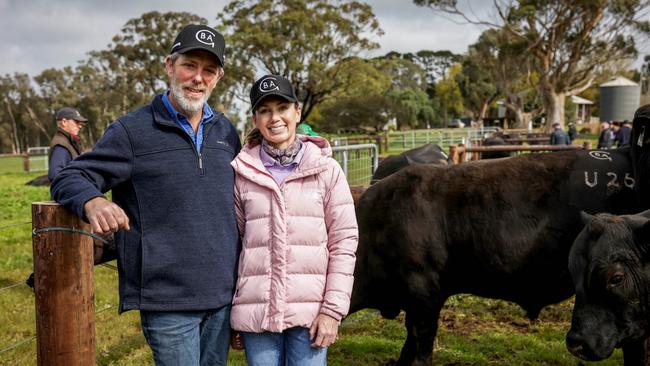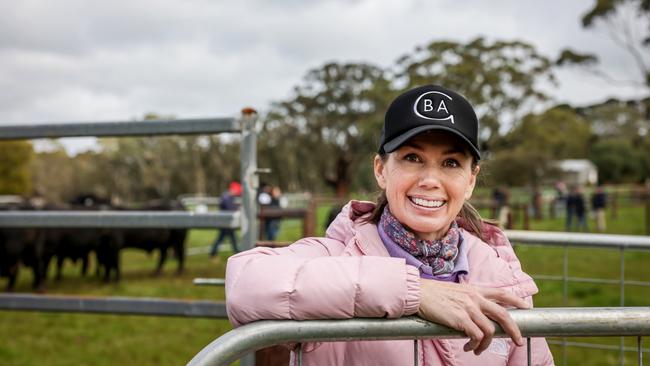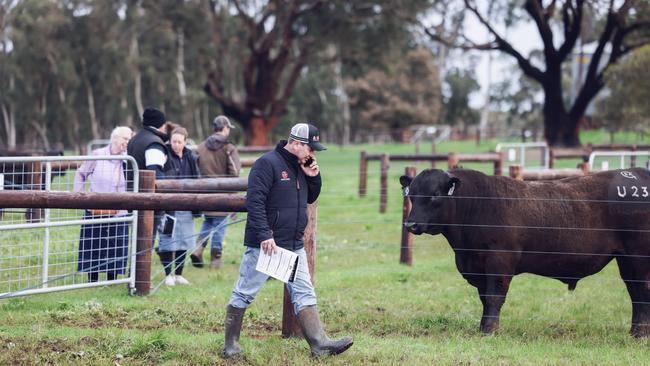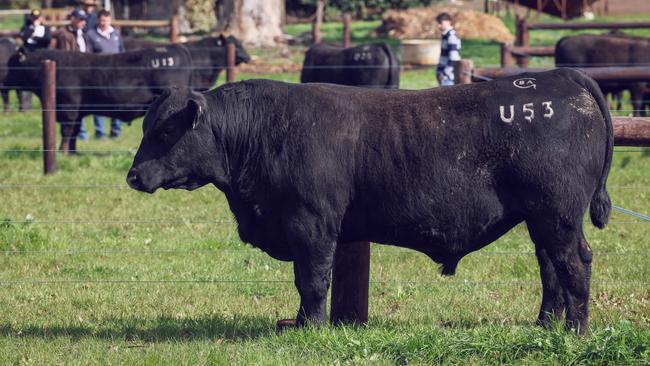First generation farmers Ben and Samantha Glatz were forced to rebuild after fire devastated their dream
First generation farmers Ben and Samantha Glatz have rebuilt their prized Angus stud in Victoria’s Western District, after a devastating bushfire almost took away their dream.

If pressure turns black coal into diamonds, black cattle breeders Ben and Samantha Glatz might be the beef industry’s equivalent.
The couple have built up both a noted Angus stud and South Australian and Victorian prime agricultural land holdings, “from scratch”. The couple are first generation farm purchasers and stud breeders, a fact they are rightly proud of.
But they have also rebuilt that same stud and their South Australian farm, and with it, their passion and drive for the industry, after the utter devastation of a bushfire, which, in 2021, came close to taking away all their hard work.
And after managing to rebuild, they again dug deep to purchase their Victorian property, Coroona, at Branxholme, to expand their geographical footprint and give the family – whose two sons, Dylan, 23, and Jack, 21, are both studying in Melbourne – a better work-life balance and to allow greater family involvement with the farm.
The Avenue Range blaze in 2021 decimated their property in South Australia’s South East, taking with it 249 stud cattle and their genetics, built up over two decades, as well as all of their farm infrastructure, and damaged their home and garden.
“It was really devastating,” Ben said, three years on.
“I thought from the start, we will rebuild.
“People would ask me, right from the start, ‘so what are you going to do now’, (implying) that we couldn’t rebuild.”
POSITIVE APPROACH
In the aftermath of the fire, Samantha said the couple worked hard to remain positive, employing the “get on with it attitude” which they have had “throughout our life together”.
Combined with support from their community, they rebuilt infrastructure at Avenue, the property they bought in 2005.
It was their first farm, and where they built up their Glatz Black Angus stud to be one of the leading seedstock businesses – being consistently among the top three for average prices paid at bull sales – in the state of SA.
After the fire, industry contacts, neighbours and friends, as well as strangers through volunteer programs such as Blaze Aid, quickly stepped in to help rehome surviving cattle and prepare the surviving bulls for sale.
“Within 24 hours they’d found homes for the few hundred cattle we had left, and they ended up being dispatched to seven or eight properties,” Ben said.

The Baker family at Woonallee Simmentals kindly offered to host the bull sale four weeks after the fire.
“I was thinking we could still have the bull sale (at home), but I was dreaming, I think I was a bit in survival mode,” Ben said.
At the time of the fire, the family were on holiday, “the first in many years” at Point Lonsdale.
Samantha said at the time, Ben might have thought he wished he was at Avenue to “potentially save more”, but she was glad they weren’t there.
“I am thankful he wasn’t, as I think he would have just about stood in front of the cattle to try to save them, so it was a blessing,” she said.
During the rebuild, having Blaze Aid volunteers there every morning, with a smile and an encouraging word, provided a real boost to morale, Ben said.
GENETIC REBUILD
Rebuilding genetics took longer than fencing, though, with Ben and Samantha determined to not take any shortcuts.
“We rebuilt the same way we started,” Ben said.
That involved selecting cows from two quality herds – SA’s Stoney Point and Tasmania’s Cluden Newry, with a small amount of embryo transfer.
“We didn’t rush, we are big on whole of herd accountability, not just having a handful of top cows,” he said.
Many of the Glatz’ clients run self-replacing herds producing weaners for sale, or finishing on grass with some short-term grain finishing.
“They don’t tend to be long-fed,” he said.
“The cattle best suited to our clients needs are sound, docile, maternal, and able to get to 350kg carcass weight, finished in a rapid period of time,” he said.
While the plan to purchase a Victorian property was in-train before the fire, and delayed as the rebuild went on, Samantha said it has now provided a “new chapter” for the family.
After the couple married in 1999 they bought a one-bedroom cottage in the Adelaide Hills, near to where Ben was working as an Angus stud manager.

Samantha was busy competing nationally in equestrian events, winning both state and national hack and rider class titles.
When the stud Ben managed dispersed they purchased some females as a foundation for their stud, running them on lease country.
Other cows were added, including from Mel Gibson’s former Beartooth Angus in NSW, and the Edwards family’s Black stud in Victoria.
Then, and now, Ben also works off-farm as an accredited ultrasound technician and Beefclass structural assessor.
He said that work gave him the opportunity to learn from other operators, throughout the country, as well as providing “pivotal cash flow” to aid the expansion of the Glatz herd.
Each year he scans about 10,000 stud cattle of all breeds, and this insight has enabled him to gather knowledge on genetics and management, as well as help with networking.
STUD GUARANTEE
Glatz Black Angus’ first bull sale was held in 2008 at Avenue.
Now, the Avenue enterprise continues, and the new Coroona property also hosts its own sale; taking the total number of bulls sold at auction and in paddock sales to about 150 annually.
Samantha said an autumn sale would also be added to the calendar, to be held at Coroona next year.
Ben describes the Glatz cattle as “easy calving, solid on growth and solid on carcass”.
“They are robust, fertile, structurally sound and docile”, which “thrive under high stocking rates”, he said.

A key selling point of their bulls was the stud guarantees their bulls for three years post-sale.
“To guarantee them from that period of time shows we’re confident in their structural soundness, correctness and docility; very few studs guarantee bulls for that long,” he said.
“We might now have 400-450 bulls under that guarantee.
“But it just isn’t a cost to us because we know they are sound and quiet.”
Across the two properties, Avenue and Coroona, the Glatz family now run a mix of breeding females, replacement females, and sale bulls, with a current herd of 400 stud breeding females, and 150 bulls to market annually.
At Coroona, the focus is now on boosting carrying capacity. The first few years in Victoria have been turbulent from a seasonal point of view; from a very wet spring, to a magnificent autumn break, and then a failed one and green drought.
But conditions appear to have improved in the past month.
The second annual spring bull sale at Coroona produced a complete clearance of 30 bulls, averaging $9800; and an additional sale of a $6500 heifer for the Angus Foundation charity which helps foster youth engagement in the industry.
“That was one way we wanted to give back – we have been supported by the industry, through the fires but also as young people getting into agriculture,” Ben said.
Looking ahead, Samantha and Ben are positive about the future of Angus cattle – the breed’s market share and “sustainability and profitability at the producer level”, he said.





